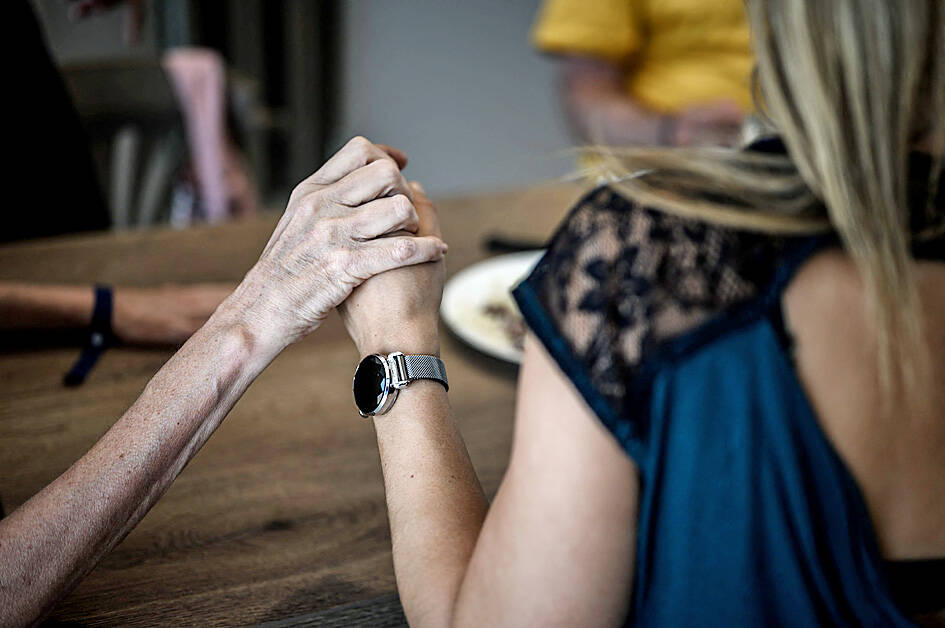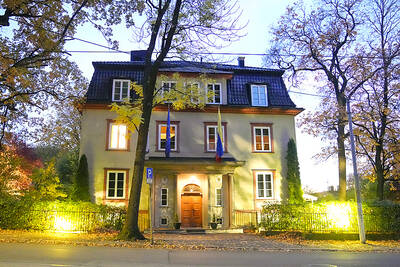After decades of unsuccessful research, two new drugs and a pioneering blood test have recently given people with Alzheimer’s hope of fighting back against the debilitating disease — but questions remain about their effectiveness.
Any path toward a cure also remains elusive for Alzheimer’s, which accounts for about 70 percent of dementia cases worldwide and is a leading cause of death among the elderly.
EFFECTIVENESS

Photo: AFP
Billions of US dollars have been spent trying to find a treatment for Alzheimer’s disease over decades, but those efforts have stubbornly fallen short — at least until recently.
Eli Lilly’s donanemab and Biogen’s and Eisai’s lecanemab are the first treatments proven to significantly slow the progression of Alzheimer’s.
However, the expensive treatments are only modestly effective, and work only for people at an early stage of the disease.
There could also be serious side effects, including potentially deadly brain hemorrhages. That has sparked a debate about whether the benefits of the drugs outweigh the risks, leading to national health regulators taking different stances.
Lecanemab, which is sold under the brand name Leqembi, has been approved in many countries, including the US.
However, French health authorities advised the state-run insurance system not to reimburse payment for the drug.
It followed in the footsteps of the UK’s state-run health service, whose spending watchdog said this year that the new Alzheimer’s drugs did not show enough benefits given their price.
DIAGNOSIS
Another debate roiling Alzheimer’s research revolves around how to diagnose the disease. The standard method has required an invasive and expensive lumbar puncture, which could rule out some more at-risk patients.
A simple blood test that detects “biological markers” of the disease has recently been developed.
US authorities have authorized the test since May, but Europe has not yet approved any Alzheimer’s blood test, one of which is the subject of a recently launched national clinical trial in the UK.
The question is whether the blood test would ever be enough by itself to confidently diagnose the disease.
The US’ Alzheimer’s Association last year changed its criteria to say that biomarkers alone were sufficient, while most specialists in Europe think a thorough clinical exam would still be needed to confirm a person’s cognitive and functional decline.
PREVENTION
One area of consensus is what makes people more at risk of getting Alzheimer’s disease and dementia more broadly.
Nearly half of all cases are linked to factors such as obesity, smoking, drinking alcohol, physical inactivity and hearing loss, according to an expert review in The Lancet last year.
There is an increasing amount of research seeking to determine whether programs encouraging people to exercise and eat better are effective at fighting Alzheimer’s, but so far the randomized controlled trials have shown limited to no effects on cognitive decline or dementia, Richard said.
A Journal of the American Medical Association study found that the cognitive decline of Alzheimer’s patients slowed slightly after undergoing two years of intensive support to be healthier.
For people with Alzheimer’s and their families, this progress might not look like much, but compared with where things were a few years ago, “it’s already huge,” French epidemiologist Cecilia Samieri said.
She said she believed that only trials lasting 10 to 15 years could really show how effective such interventions could be against long-developing diseases such as Alzheimer’s.

The Venezuelan government on Monday said that it would close its embassies in Norway and Australia, and open new ones in Burkina Faso and Zimbabwe in a restructuring of its foreign service, after weeks of growing tensions with the US. The closures are part of the “strategic reassignation of resources,” Venezueland President Nicolas Maduro’s government said in a statement, adding that consular services to Venezuelans in Norway and Australia would be provided by diplomatic missions, with details to be shared in the coming days. The Norwegian Ministry of Foreign Affairs said that it had received notice of the embassy closure, but no

A missing fingertip offers a clue to Mako Nishimura’s criminal past as one of Japan’s few female yakuza, but after clawing her way out of the underworld, she now spends her days helping other retired gangsters reintegrate into society. The multibillion-dollar yakuza organized crime network has long ruled over Japan’s drug rings, illicit gambling dens and sex trade. In the past few years, the empire has started to crumble as members have dwindled and laws targeting mafia are tightened. An intensifying police crackdown has shrunk yakuza forces nationwide, with their numbers dipping below 20,000 last year for the first time since records

EXTRADITION FEARS: The legislative changes come five years after a treaty was suspended in response to the territory’s crackdown on democracy advocates Exiled Hong Kong dissidents said they fear UK government plans to restart some extraditions with the territory could put them in greater danger, adding that Hong Kong authorities would use any pretext to pursue them. An amendment to UK extradition laws was passed on Tuesday. It came more than five years after the UK and several other countries suspended extradition treaties with Hong Kong in response to a government crackdown on the democracy movement and its imposition of a National Security Law. The British Home Office said that the suspension of the treaty made all extraditions with Hong Kong impossible “even if

Former Japanese prime minister Tomiichi Murayama, best known for making a statement apologizing over World War II, died yesterday aged 101, officials said. Murayama in 1995 expressed “deep remorse” over the country’s atrocities in Asia. The statement became a benchmark for Tokyo’s subsequent apologies over World War II. “Tomiichi Murayama, the father of Japanese politics, passed away today at 11:28am at a hospital in Oita City at the age of 101,” Social Democratic Party Chairwoman Mizuho Fukushima said. Party Secretary-General Hiroyuki Takano said he had been informed that the former prime minister died of old age. In the landmark statement in August 1995, Murayama said